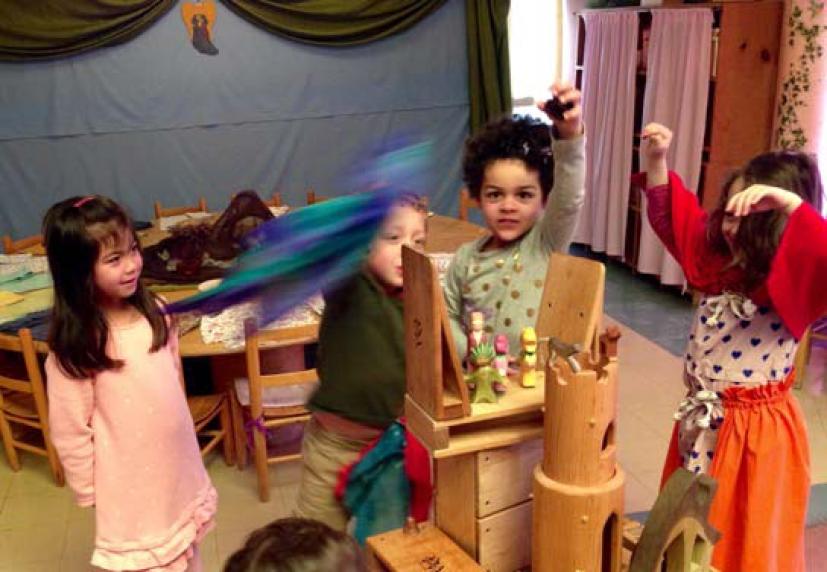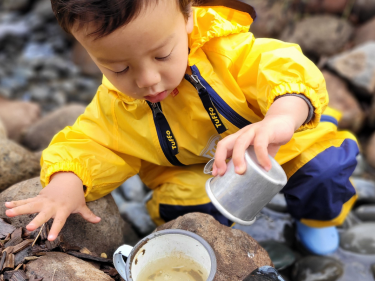Getting Kids off the Fast Track so They Can Play: An Interview with the Mountain School's Lori Grey

 It’s been 14 years since Lori Grey’s everyday life revolved around the Mountain School, as her daughter, Haley, attended as a three and four-year-old. “It feels nice to come full circle.” Now a college-bound senior at San Francisco Waldorf School, Grey says Haley has fond memories of her time at the school. “She knew she was exactly where she was supposed to be. She had the experience of being fully three and fully four.”
It’s been 14 years since Lori Grey’s everyday life revolved around the Mountain School, as her daughter, Haley, attended as a three and four-year-old. “It feels nice to come full circle.” Now a college-bound senior at San Francisco Waldorf School, Grey says Haley has fond memories of her time at the school. “She knew she was exactly where she was supposed to be. She had the experience of being fully three and fully four.”
Grey sat down with Mountain School parent Beth Tribolet on an October afternoon to discuss what constitutes Waldorf-inspired education, as the sounds of children at play wafted through her office.
At its best, what can a Waldorf-inspired preschool accomplish?
You want to bring out the best in children; you want to bring out their soul and their personalities. In Waldorf education there’s a common central theme that says children need to engage with each other, engage with nature, and engage with play in a deep and meaningful way. Essentially it is the best preparation for life. You are definitely dealing with the individual but you’re also dealing with fostering community spirit. It’s not just about them as individuals but it is about individuals in the spirit of community, which you achieve by developing empathy skills.
Children at the Mountain School have ample time for free play during the school day. Why is free play so important to a child’s development?
No one is telling them what to do and when to do it, so they learn to initiate activities on their own. The kids who learn self-initiated play are the ones who are going to change the world. They’re not waiting for someone else to tell them what to do. They’re going to go out and do it, they’re going to be the leaders, and they’re going to take control.
We believe in getting kids off the fast track here. They need to be out doors, and they need to be moving, but they don’t need adult-directed activities all the time. They really need their own self-initiated activities.
Child psychologist and author Madeline Levine, who lives in Marin, talks about the perils of kids being human doings not human beings. I read an article recently about kids arriving at college who have been helicopter-parented their whole lives, and they don’t know what to do. They can shake your hand, and look you in the eye but they don’t know how to self-initiate anything, and they are going into safe majors or safe classes, instead of subjects that could really inspire them. Most likely they will contribute something to society rather than just being takers and participating in activities without caring how they affect others.
How does self-initiation benefit the child?
So much of what we learn in school is self-taught. Yes you have a teacher, yes they are giving you information, but if you don’t bring your own curiosity and your imagination, or knowledge to the subject, it’s much harder to learn. It’s just a long way of saying that if you’re curious and you want to learn, you develop that love and desire to learn because you know how to self-initiate the learning process.
You can’t impose a desire to learn on a child. They have to seek it willingly in order to get the most out of their education. So this ability to self-initiate leads to self-teaching later on in life.
What else does free play teach preschoolers?
It teaches the essential skill set of being able to get along with others. It’s valuable to discover “Oh, they don’t like it when I do this.” They’re learning how to be around others, and also learning how to be more empathetic with others. The lesson is: “If I do something that my playmates don’t like, I’ll need to respond with empathy because I don’t want that kind of reaction when I’m around people.” Eventually they learn how to be around others.
Kids learn empathy and problem-solving skills that are generated through creativity and imagination. If I can imagine it, I can make it happen. If I can think differently and not think like everyone else then maybe, eventually, I can solve problems. Kids learn empathy, cooperation and problem-solving skills generated through self-initiated and group activities.
You mentioned the recent Washington Post blog about the decline of play among preschoolers. What’s at stake when kids don’t play enough at ages 3, 4 and 5?
The article describes an issue called sensory propriaception. If a child is not moving enough, and not doing activities such as throwing a ball or sweeping, they’re not integrating the right and left side of the brain. They need to be “crossing the midline” which is moving across the right and the left side of the brain. If a child is, not doing those kinds of activities at school, and if they’re not out running around their neighborhoods after school, they’re not developing in an optimal way. And as a result they can’t sit still to learn, they fall off their chairs, or run into other people and objects. It’s because the right and the left sides of their brains haven’t integrated properly.
This is why it is so important for kids in preschool to move and play freely during the day, and only then will they be ready for the academics; the body needs to be ready first.
To note what is at stake, I would point you to an article from Psychology Today by Peter Gray. He correlates a decrease in free play time in schoolchildren to increased levels of anxiety and depression among young people.
From the article:
“By depriving children of opportunities to play on their own, away from direct adult supervision and control, we are depriving them of opportunities to learn how to take control of their own lives. We may think we are protecting them, but in fact we are diminishing their joy, diminishing their sense of self-control, preventing them from discovering and exploring the endeavors they would most love, and increasing the odds that they will suffer from anxiety, depression, and other disorders.
What happens if you try to force kids to use their intellects too soon?
If they are not developing their physical selves, they cannot sit still, and they can’t transition well from one activity to another because they have to over-think it. They’re in their heads, they are not naturally using their bodies to transition, they are thinking about things too much. Children are intellectualized too early are often challenged when it comes to getting along with other children. Maybe the other children aren’t at their intellectual level and they don’t understand what they’re saying. Kids need to relate to each other through play not through just talking at each other or trying to decipher speech.
Can you give example of how to talk with a four-year-old without engaging the intellect? How would you suggest we answer our kids when they ask, let’s say, “Why is the sky blue?”
The answer is not about scattering light or physics. They don’t need to know that right away, they need to experience instead of analyzing. The answer could be “Hmmm that’s a good question,” or, “What do you think?” Or, it could be as simple as, “Gosh, I wonder?” You don’t have to answer every question accurately. You could even say, “Because it’s the color of your eyes.”
If kids are pushed into the intellectual realm too soon, and they haven’t developed their imagination, creativity and physical bodies, it will be hard to retrieve these elements. It could make it harder for them to relate to others later on because they haven’t had a playful quality instilled in them early.
They say that the body informs the brain instead of the other way around. The body is the foundation for the brain. If you bypass that then you’ve skipped a really important stage of self-development.
By not giving children ample time to play, are we undermining our ability to educate them?
Sure. If they don’t have the ability to take in information and transform it because they can’t sit still or they can’t focus, then they struggle. I’m concerned about overstimulation--it leads to lack of focus. Kids need a lot of down time to process, and we offer that to children who stay for the afternoon program here at the Mountain School. They get a chance to soak in all that they’ve experienced in the morning sessions.
Kids today are overscheduled. They have too many extracurricular activities, and too many devices. Devices are everywhere. If a child has a tendency toward hyperactivity, screens can exacerbate the problem.
So it’s overstimulation, and screens, and perhaps even what they are eating. I definitely think kids’ lives are too busy. They just need to slow down and enjoy quiet times.
How is the emphasis on play part of the Waldorf tradition?
We recognize that kids have developmental stages, and make sure that their activities match their developmental age. For our children who are in the first stage between ages zero and seven, they learn through imitation, and we are proud that we have adults who are worthy of imitation! They also learn by doing, and they like learning through their bodies.
The first seven years are the most important for brain development. It’s not early academics it’s pre-academics, laying that foundation through development of their physical, social, emotional and empathetic skills. There’s been some recent research about social and emotional intelligence being a far better predictor of success than cognitive skills.
What is your vision for the Mountain School going forward?
I hope to lay a foundation for sustainability of the Mountain School for decades to come. That’s really what I want–that’s my vision—that it’s sustainable, to educate and prepare children for what comes next, and to continue to prepare generations for the future. It is my vision for Marin County to have the Mountain School for generations to come.
In the best of all possible worlds, can the Mountain School give back to the Marin community?
Absolutely. We are planting seeds for the future so these children will give back to their communities because they’ve had a healthy beginning of their lives. It’s about their physical, emotional, social and spiritual health. That’s what we are giving them here, a chance to build a healthy foundation for life.
Author Beth Tribolet moved to Marin in 2012 after her daughter was born. A former Senior Producer at ABC Network News in New York she is a Media Trainer and Video Producer, and can be reached at BethTribolet@gmail.com.








